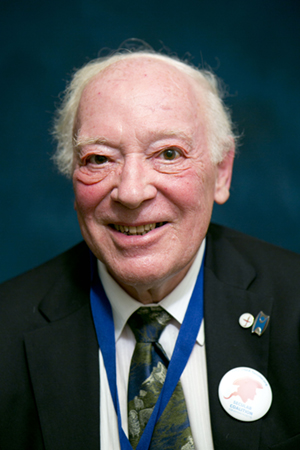
Photo credit: Brent Nicastro
Congratulations to Ellery Schempp and his sister Donna, on the 60th anniversary of the case they brought that resulted in a landmark decision by the Supreme Court in 1963 declaring unconstitutional bible readings and recitation of the Lord’s Prayer in public schools.
In that ruling, the court wrote, “The breach of neutrality that is today a trickling stream may all too soon become a raging torrent . . .”
That decision and the Engel prayer ruling the year before — joined by the 1992 Weisman decision against graduation prayers and the 2000 Doe decision against broadcasting prayers at school events — indeed for decades have stemmed the tide of proselytization of a captive audience of public school students. (Unfortunately, there is still constant mopping up required to enforce these rulings, with 50 percent of complaints FFRF receives dealing with religious encroachments in our public schools.)
Today, Ellery is a Lifetime Member of the Freedom From Religion Foundation, a retired scientist who had a distinguished career and a passionate defender of civil liberties. Back in 1956, when this case began, he was a feisty 16-year-old who rebelled against a Pennsylvania law he knew was wrong that required starting every school day by reading 10 bible verses out loud. He began bringing a copy of the Quran to school, just to show that the bible was not the “only holy book” and read it while the teacher was reading bible verses to the class, also refusing to stand as a student duly recited the daily prayer.
This got him sent to the principal’s office, then, to Ellery’s amusement, to the guidance counselor, who wanted to know if he was having problems at home. “No,” Ellery told him, “I just disagree about bible reading and prayer.”
That evening he sat down and wrote the American Civil Liberties Union a letter asking them to challenge this law that “arbitrarily and seemingly unrighteously and unconstitutionally compels the bible to be read in our public school system.” He asked them to help free “American youth in Pennsylvania from this gross violation of the religious rights as guaranteed in the First and foremost Amendment in our United States Constitution.” (He also enclosed 10 hard-earned dollars, which would be about $111 today.) Eventually the ACLU was persuaded, and the rest is history.
After Ellery graduated, he was not able to continue as a plaintiff in the lawsuit, but his younger siblings Donna and Roger (who is no longer alive) continued, along with his father Ed and mother Sidney. Their case, joined with Murray v. Curtlett, resulted in an amazing-by-today’s standards 8-1 decision written by Justice Tom Clark.
“The decision made national news and caused outrage on a grand scale,” Ellery told the national Freedom From Religion Foundation convention in 2013, the year of the decision’s 50th anniversary. The family received about 5,000 letters, one-third pro, one-third reasonably differing and one-third “hateful, vituperative and ugly.” Some sent newspaper clippings smeared with excrement.
Ellery at 82 remains as feisty today as he was as that 16-year-old. In an interview last week on Freethought Radio, he wanted to talk about the harm of religion as much as about the need to support the separation of state and church. After all, he was forced to endure thousands of readings of bible verses in public school, so he knows what he’s talking about. “There’s nothing in the Constitution about the bible, and there’s nothing in the bible about democracy or the Constitution,” as Ellery says. He doesn’t want to dwell only on the past decision, but to look to the future, because the decision his family won is very much endangered, as the extremist Supreme Court’s decision in last year’s Bremerton ruling more than hints.
Although Ellery is modest, he and his sister are heroes. And this anniversary deserves celebration. One way to honor the anniversary is to learn more. You can meet Ed Schempp, who briefly appears in FFRF’s half-hour 1988 film, Champions of the First Amendment, watch Ellery on FFRF’s TV show, “Freethought Matters,” or read more about the case in the well-researched book, Ellery’s Protest. Enjoy Ellery’s full remarks on the occasion of the decision’s 50th anniversary year.
In that speech, Ellery noted: “In the Abington decision, the court recognized that children are particularly vulnerable and deserve particular protection for their developing thoughts as to their freedoms of belief, without coercion from a majority or a dominant religious faith’s belief. Being excused from class was not an effective answer. Self-identifying as a dissenter or nonbeliever opens the door to discrimination and taunting.”
As we witness Christian nationalists relentlessly fighting to insert prayers, religious indoctrination and even the Ten Commandments into the symbol of our democracy — our public schools — Ellery’s caution is more relevant than ever.
The very best way to celebrate the Schempp decision is to join in the work of the Freedom From Religion Foundation, in speaking out for the separation of state and church — especially in keeping divisive religion out of our public school.
Correct the Big Lie that this is a Christian nation whenever you encounter it. It doesn’t involve huge effort to write letters to the editor and comment on social media. Vote, including in those seemingly lesser races, because Moms for Liberty and other extremists are targeting school boards. Monitor your own schools and communities. And when you encounter state/church violations, let FFRF know. Then do as Ellery did — and make a fuss.
We must all do whatever we can to ensure that the Schempp decision will celebrate more anniversaries.
The Freedom From Religion Foundation is a national nonprofit organization with more than 40,000 members across the country. Our purposes are to protect the constitutional principle of separation between state and church, and to educate the public on matters relating to nontheism.

